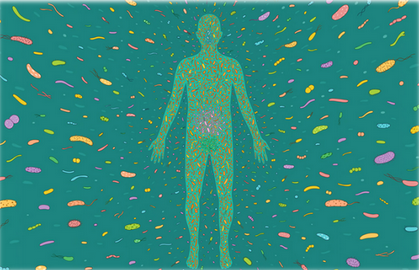In recent years the definition of the human microbiome has been postulated as an essential tool for medicine, pharmacy, nutrition and other disciplines in order to understand the role of microorganisms present in the body on health and immunity. In fact, the microbiome affects aging, digestion, immune system, mood and cognitive functions.
But, what is the microbiome?
There are different definitions for this term. Generally speaking, we can say that the human microbiome is the set of microorganisms in each person (microbiota)and the genes these cells harbour.
Microbiome research area comprises a field of science associated primarily with advances in DNA / RNA sequencing and computational biology. Thus, the microbiome can be defined as the genomic content of all microorganisms recovered from a habitat or ecosystem (eg saliva, feces or skin).
The study of the microbiome started in the 17th century with the development of the first microscopes and the beginnings of the science of microbiology. However, it has been in recent years when the development of rapid sequencing methods, the reduction of the costs associated with these techniques and the development of data management techniques have been developed which has enabled the microbiome and its constituents.
And why is it important?
Taking into account that the number of microorganisms that we harbour is between 10 and 100 billion (ten times higher than our number of cells), that we can have more than ten thousand different species and that the types of microorganism vary greatly among different people, we can think that the microbiome has a special role in our health. In fact, the knowledge of these microorganisms, the functions of their genes, their metabolic and regulatory pathways is already allowing them to develop strategies to prevent diseases and improve general health.
However, the microbiome of each person is not something static. Nutritional imbalances, lifestyle, use (and abuse) of antibiotics, low exposure to pathogens (or excess of hygiene) permanently modify our microbiome.
And what is your relationship with the diet?
There is a clear relationship between what we eat and the balance of our native flora that has a direct impact on our health status. Indeed, is interesting that changes in diet are always accompanied by changes in the microbiota and the enrichment of their corresponding genes.
Balanced diets can promote a proper and well-structured microbiota and conversely, alterations in the composition of our microbiota or reduction of some of the microorganisms that make up the diversity of the microbiota, increase the risk of suffering from diseases related to lifestyle such as allergies, diabetes, obesity and / or irritable bowel syndrome. In addition, a prolonged state of these situations has been related to metabolic alterations.
Recent studies have shown that there are notable differences in the microbiota of people who follow rich meat diets versus those who follow more ancestral life-styles and diets based mainly on vegetable consumption. There are studies that suggest that a type of diet rich in proteins and animal fat is associated with a particular kind of flora while carbohydrate-rich diets are associated with the prevalence of another type of flora. These differences have been linked to the risk of developing non-communicable diseases such as atherosclerosis.

Over and undernutrition malnutrition has a direct impact on the microbiota that favours alterations of the same that, finally, lead to problems associated with an increase in inflammation and metabolic problems. A strong influence has been observed in nutrient-poor diets, especially those deficient in certain amino acids, in the positive incidence of intestinal inflammation. Likewise, the pathogenesis of various diseases is associated with certain components of the diet that promote disorders in the microbiota.
Therefore, the better balanced the diet, the more diverse the microbiota. Thus, intervention through personalized diets improves the response in individuals with low microbiome richness.
And then, can it be improved?
Of course we can! The importance of food, nutritional balance and life-style have a direct influence on the composition of our microbiota and its activity and, therefore, directly on our health. From this relationship arises the interest to develop new strategies to personalize our diet.
With the M of microbioma and the M of malnutrition of which we spoke in our previous post, we have to say, also with M, that …we can do MORE: improve our diet and our way of life.
- Food reformulation; a step forward, that it is possible - 21 May 2024
- World Food Day; with soul of water - 16 October 2023
- Redefining the value fo snacks; stress & snacks - 12 May 2023

